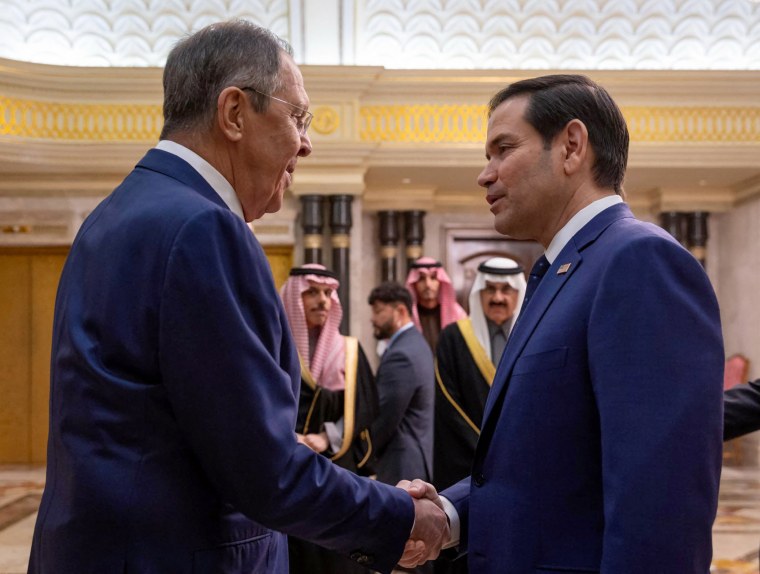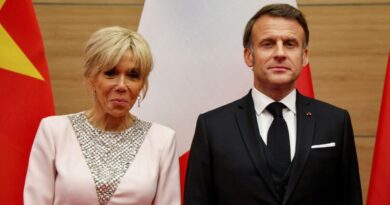As Trump detonates relationship with Ukraine, Europe has no answer
The latest talks take place on the same day that Zelenskyy hit back at comments from Trump on Tuesday in which he blamed Ukraine for starting its war with Russia. The Ukrainian leader accused Trump of being trapped in a “disinformation bubble” and added that his country was not for sale.
Trump’s swift reversal of American policy toward Russia may have thawed relations with Moscow, which has faced diplomatic and financial isolation since Russian President Vladimir Putin launched his invasion of Ukraine in February 2022, but it has brought with it a sharp turn away from Kyiv and sparked alarm across Europe.
“We are in, I think, a very serious situation here where the assumptions of many decades have simply been blown away — and principally, the assumption that the U.S. will underwrite Europe’s security,” said Lough, who previously served as a NATO representative based in Moscow.
The sharp shift in Washington comes at a rare moment for the European Union — the disparate and sprawling 27-nation bloc of more than 500 million people — when the region has few strong leaders.
With German Chancellor Olof Scholz’s party expected to perform poorly in elections on Sunday and after Macron’s party lost its parliamentary majority last summer, the E.U.’s usual power centers are weak.
British Prime Minister Keir Starmer, who won a landslide election last year and heads one of Europe’s largest economies, can only advise the E.U. from the outside following the U.K.’s departure from the bloc in 2020.
Now, drained of firm leadership and fatigued by Ukraine’s long war, “the Europeans have been really slow to recognize” America’s shift, said Ed Arnold, a senior research fellow for European security at the Royal United Services Institute, a London-based think tank.
That Europeans “can’t fully rely on the U.S., that’s something that’s just been around for a number of years but it’s now that the Europeans are starting to panic at it because actually it could be worse than they have assumed,” he said.

Whether that realization has set in remains unclear.
After European leaders consulted Tuesday with U.S. Secretary of State Marco Rubio following talks in Saudi Arabia with his Russian counterparts, E.U. foreign affairs chief Kaja Kallas wrote on X that “Russia will try to divide us. Let’s not walk into their traps.”
“By working together with the U.S., we can achieve a just and lasting peace — on Ukraine’s terms,” she said.
But so far, European leaders have failed to present a clear and cohesive response to the rapid-fire developments in diplomatic efforts to end the war in Ukraine. Instead, turmoil over Trump’s stance on the war is highlighting divisions and disunity within Europe, Arnold said.
“I think that’s what Trump’s trying to do in Europe. He’s trying to circumvent the organization,” he said, adding that Trump wants to “almost play them a little bit off each other to almost get what he wants.”
A key focus in emergency discussions has been determining what potential security guarantees for Ukraine might look like, with French President Emmanuel Macron and other European leaders maintaining that any agreement to end the war in Ukraine must come with “strong and credible security guarantees for the Ukrainians.”
After leaders discussed the possibility of countries including Britain, France and Poland deploying troops to Ukraine as peacekeepers, the U.K.’s Starmer said he was considering committing British forces but maintained that “a U.S. security guarantee is the only way to effectively deter Russia.”
With Starmer and Trump due to meet in Washington next week, Lough said European leaders were having a “panic reaction” as they “try to figure out what they can do to persuade Trump” to jointly safeguard Ukraine’s security.
So far, Russia has known what it wants. The talks Rubio and Russian foreign minister Sergei Lavrov engaged in this week culminated in a plan to restore embassy staffing on both sides and to continue discussions on a path to ending the war in Ukraine.
“The constant expulsion of diplomats from Washington and Moscow does not lead to anything good,” Putin told reporters in St. Petersburg on Wednesday. He added that, in Tuesday’s talks in Riyadh, “on the American side, there were entirely different people who were open to the negotiation process without any bias, without any prejudice to what was done in the past.”
Keith Kellogg, Washington’s special envoy for Ukraine and Russia arrived in Kyiv on Wednesday for what is likely to be a tense visit. Zelenskyy said earlier this week he hoped to take Kellogg “to the front line” and to meetings with intelligence officials and diplomats so he could “bring more information back to America.”





